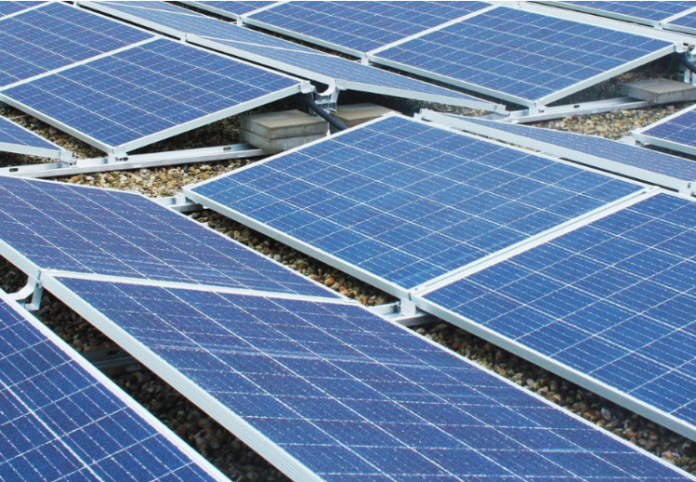The Housing Initiative Partnership (HIP), a green nonprofit affordable housing developer based in Prince George’s County, along with Pepco and Emera Technologies, has been awarded a $200,000 grant from the Maryland Energy Administration (MEA) to construct a new residential microgrid to power a small subdivision of new Net Zero single family homes in Fairmount Heights, Maryland.
The grant builds on efforts catalyzed by is an extension of the MEA’s Resilient Maryland program and will support a community solar and battery energy storage system, as well as the associated racking, mounting and wiring equipment, for six low-to-moderate income households. This innovative pilot project, which received design and feasibility funding in 2020, will enable the new homeowners to generate their own energy independent of the public electrical grid.
“Supporting the development of new and affordable, clean energy homes for first time low-to-moderate income home buyers is a sustainable model Maryland can build upon,” said Governor Larry Hogan.
This project was originally proposed to the Maryland Energy Administration in 2020 by HIP’s architect, Peabody & Fine Architects. The resulting feasibility study conducted was part of MEA’s efforts to support microgrid and other distributed energy resource systems that bring clean, reliable and flexible energy solutions to Maryland organizations and communities. This microgrid is an integral part of creating a community that makes affordable, sustainable and resilient new construction housing more accessible to Maryland’s low-to-moderate income population.
“HIP is focused on developing affordable housing that is both healthy and highly energy efficient in older neighborhoods across Prince George’s County. This will be our second project in Fairmount Heights focused on passive design and affordable home ownership,” said Stephanie Prange-Proestel, HIP’s deputy director, who serves as the project manager for the development team.
HIP expects to break ground on Phase I of the development in the fall of 2021. Six single-family homes will be built on vacant lots on 60th Place in Fairmount Heights using modular construction, designed to meet the U.S. Department of Energy’s Zero Ready Energy standards and the Passive House Institute’s PHIUS+ 2018 standard. These rigorous requirements ensure energy savings, comfort, health and durability. HIP will market the homes to first-time homebuyers earning 80% or less of the area median income.
The collaboration of community partners looks forward to providing electricity generation solutions like rooftop community solar to modernize grid technologies in neighborhoods such as Fairmount Heights, which will help meet state and county de-carbonization goals. Emera Technologies’ residential microgrid solution BlockEnergy will allow for homes to share the benefits of combined renewable generation. The community microgrid system also provides reliability and resiliency for the neighborhood.
“The BlockEnergy microgrid is a utility-focused system that easily scales to meet new residential growth and gives utilities the ability to manage distributed community energy with a single point of control. This partnership is a great model for what is possible when we work together to use new technology like BlockEnergy to bring clean, reliable energy sources cost-effectively to customers in communities across the country,” said President and CEO of Emera Technologies Rob Bennett.
Fairmount Heights, Maryland, the second oldest African American majority municipality in Prince George’s County, is home to just under 2,000 residents and a model location for clean and resilient development. The town has set ambitious goals for 2021 to revitalize vacant land with projects that will encourage citizen engagement and attract growth while minimizing its carbon footprint and promoting a green, sustainable future. Working with Pepco, HIP and Emera Technologies to complete this onsite microgrid project will also mark yet another step in Fairmount Heights’ efforts to earn certification from Sustainable Maryland, a program for Maryland municipalities that want to go green, save money and take steps to sustain their quality of life over the long term.
Pepco and Emera Technologies will install the microgrid elements, and supporting distribution infrastructure, alongside the construction of the homes. For the first three years after residents move into the new homes, Pepco will operate a pilot in conjunction with the other partners to collect data for specific metrics related to the system and potential benefits to the distribution system. Pepco will share additional details regarding the design, goals, proposed metrics and timeline associated with the three-year pilot with the Maryland Public Service Commission, community members and the public later this year.
Affordable access to sustainable energy has taken center stage in communities across America in the face of increasing threats from climate change, which can disproportionately affect our most vulnerable communities. The Fairmount Heights Net Zero community will provide replicable, scalable, and cost-effective solutions that will serve as models for wide-scale adoption across Maryland. This pilot underscores the importance of state investments in positively advancing the local energy grid through collaboratively identified inclusive and equitable solutions.






